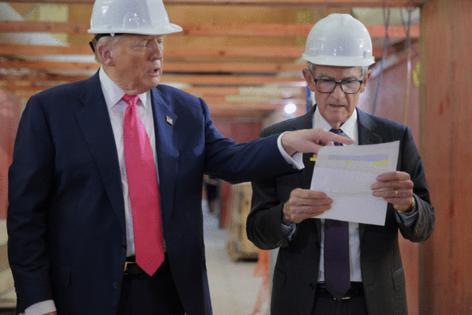Commentary: What Congress can and should do about the Fed's independence
Published in Political News
For many decades, politicians of both parties and almost all economists have recognized the independence of the U.S. Federal Reserve as a cornerstone of the American economy — and indeed the world economy. The Fed’s independence itself fuels the U.S.’ prominence in the world economy and supports international and domestic investment. Recent reports, while rarely naming names, assure us that both Democratic and Republican members of Congress continue to believe all of this.
What can Congress do, though, if President Donald Trump wins his battle to remove members of the Fed’s Board of Governors? Let us imagine the worst (but likely) future and assume that the Supreme Court would back the president, either by holding that statutory protections limiting removals by requiring “cause” are unconstitutional, or by holding that anything the president says is cause is enough. (To be clear, I think the court would be wrong to say either of these, but I think it quite possible it will do so.) If this were to happen, Congress would be hard-pressed to write a new statute that creates pre-termination hearings or otherwise seeks to limit the power of the president that would satisfy the court’s aggressive support for presidential removals.
Congress, however, should not wait. Congress should immediately act to preserve the Fed’s independence. Even waiting for this to play out in the courts will be damaging and uncertain.
How can Congress respond? The first and most obvious move is that a majority of senators should immediately announce that they will not confirm any new nominees for the Fed until the terms of the existing member expires (barring death or resignation). Of course, the Senate can play even harder ball by refusing to act on any nominees or pausing action on any legislation. Perhaps in a retaliatory response, the president would fire even more of the Fed’s governors. (Though it is hard to believe the president would wholly disable the Fed, as his stated goal is for it to lower rates, after all.) If a firing spree does ensue, Congress will simply have to fight back with every weapon. But it need not come to that — if Congress shows sufficient resolve on confirmations.
At the same time, and with a view toward avoiding future crises, the Senate should quickly form an expert committee of economists and others to recommend new governors, and a bipartisan majority of senators must commit that it will only confirm nominees from its list. Of course, the senators need to actually respect standards of economic expertise and integrity, but so far this has largely worked out in the history of the Fed — with both presidents and senators doing so. At a time in which the president does not care about expertise (or economics, really), the Senate must build its own real capacity to evaluate candidates. And it can take the lead. The Senate does not have the power to nominate, but it can make clear who it will and won’t confirm. These sorts of negotiations happen between the president and congressional leadership all the time.
Another option would see the Senate restore the filibuster to its confirmation process for the Fed’s nominees. This seems a further reach, however, and has the feeling of another political process; the first two steps commit the Senate to respecting expertise and independence.
The House can also play hardball, if a bipartisan majority of representatives supports Fed independence — as they do and should. The House’s tools are blunter, by stalling other legislation, especially appropriations. But the House as well as the Senate can hold oversight hearings and leadership has a bully pulpit to push back. The House can form its own expert committees, and more in-house economic expertise in both chambers is deeply needed.
In the Constitution’s vision, Congress — not the executive — should have the lead in setting national policy, economic and otherwise. The Senate’s authority to confirm or deny the president’s nominees is incontrovertible. It is well past time, and particularly important here, that Congress act to protect the Fed’s independence. It can do so with just a few relatively clear steps.
Congress must start doing its job, and this is the perfect — and a fundamentally important — place to begin.
____
James B. Speta holds the Elizabeth Froehling Horner professor of law and commerce at the Northwestern Pritzker School of Law.
___
©2025 Chicago Tribune. Visit at chicagotribune.com. Distributed by Tribune Content Agency, LLC.
























































Comments